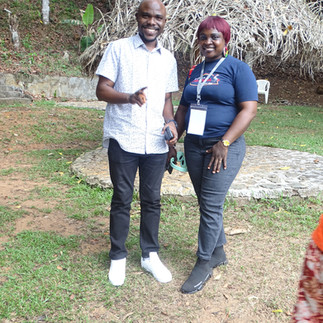Reflections on the International Summer School on Public Policy | Juliet Frimpomaa
- Open Dreams

- Apr 19, 2025
- 3 min read
I was honored to participate in the recently concluded International Summer School on Public Policy, organized by the International Public Policy Association in Yaoundé, from March 24th - 28th, 2025. This journey was more than an academic exercise; it was an immersion into the dynamic world of policymaking, connecting with brilliant minds across Africa, and embracing the ecological richness of Cameroon. Here’s my story.

Day 1: A Majestic Beginning
The excitement was palpable as we kicked off with the theme "Africa at the Time of Ecological Transition." The atmosphere buzzed with energy as scholars and researchers gathered to dissect public policy in an African context. We delved into theories like constructivism and pragmatism, uncovering layers of meaning I had never fully grasped before. For the first time, I understood that public policy extends beyond government interactions—it is shaped by external forces, particularly donors. Professor Manga Mireille delivered an insightful lecture, leaving us with much to ponder.

Day 2: The Power of Policy Instruments and My Moment to Shine
We started the day exploring the relationship between governments and their partners, a crucial aspect of policy implementation. The session on policy instruments versus tools was an eye-opener—who knew these terms weren’t interchangeable? But the highlight for me was presenting my research paper: "The Resurgence of Military Coups in Francophone Africa: Pathways to Sustainable Stability?" Standing before fellow researchers and scholars, sharing my findings, and receiving critical feedback was empowering. It reaffirmed the importance of my work and its relevance in today’s political landscape.
Day 3: Nature’s Embrace and a 2000-Year-Old Witness
This day was unlike any other. We traded the lecture hall for an excursion to the Nyong River in Mbalmayo. The air was thick with adventure as we navigated the river and ventured into a forest holding a profound secret—a 2000-year-old tree. Standing before that ancient giant, I felt the weight of history and the urgency of ecological preservation. It was a poignant reminder that policymaking isn’t just about laws and strategies; it’s about protecting legacies for future generations.
Day 4: Crisis and Policy Change
Back to academia, but with a renewed spirit. Professor Patrick Hassenteufel led us through a gripping session on crisis and policy change. We examined the anatomy of crises, their dichotomies, and their transformative power in shaping policy decisions. It was fascinating to explore how different types of crises demand varied responses, reinforcing the dynamic nature of policymaking.
Day 5: The Final Curtain
The last day was bittersweet. We wrapped up with final presentations and closing reflections. Each participant brought a unique perspective, and together, we wove a tapestry of ideas that will undoubtedly influence future policies across Africa. As I sat there, absorbing the discussions and the collective brilliance in the room, I felt an overwhelming sense of gratitude.
Final Thoughts: A Journey Worth Taking
The International Summer School on Public Policy was more than a learning experience—it was a journey of self-discovery, intellectual growth, and profound connections. I left with new knowledge, friendships, and a deeper appreciation for Africa’s place in the global policy landscape.

If there’s one thing I took away, it’s this: policy is alive, evolving, and Africa needs to develop her own policies that reflect their context. And as young African scholars and practitioners, we have a duty to shape it with wisdom, courage, and vision. It was indeed a Transformative Experience in Yaoundé
Until the next adventure
Juliet Frimpomaa | Open Dreams











Great one there, I admire your critical thinking skills and open mindedness on key issues of this nature. It takes maturity and a high sense of patriotism to embrace and pursue development oriented policies at all levels, leading to nation building and sustainable development.